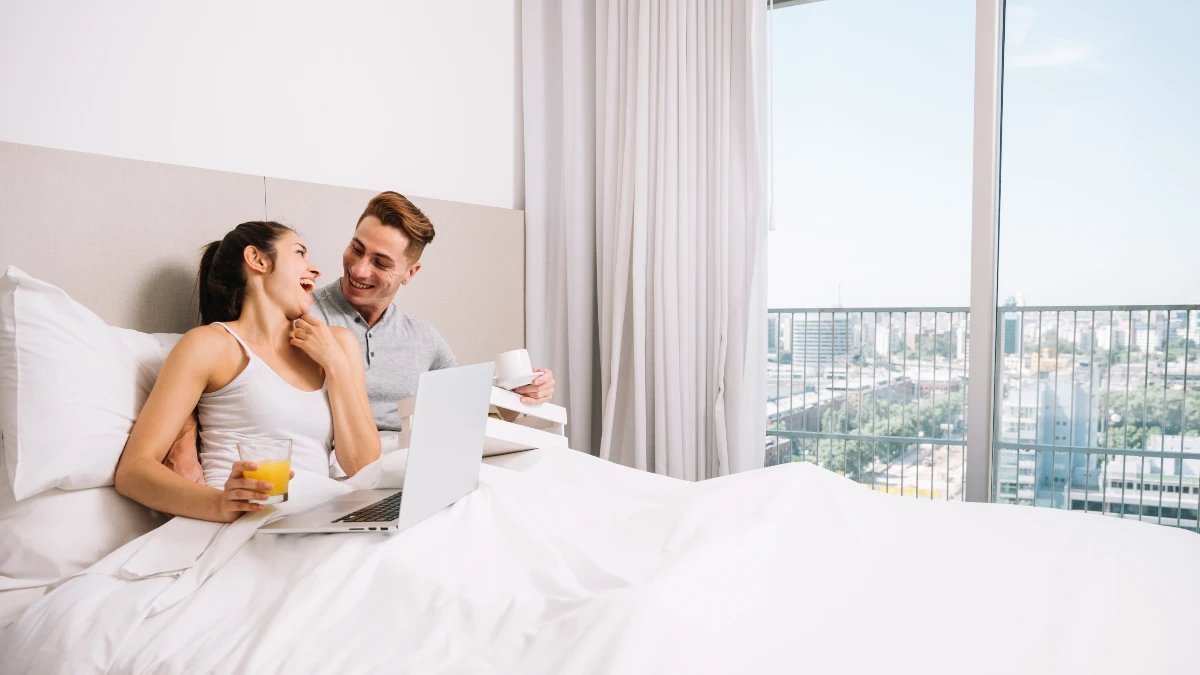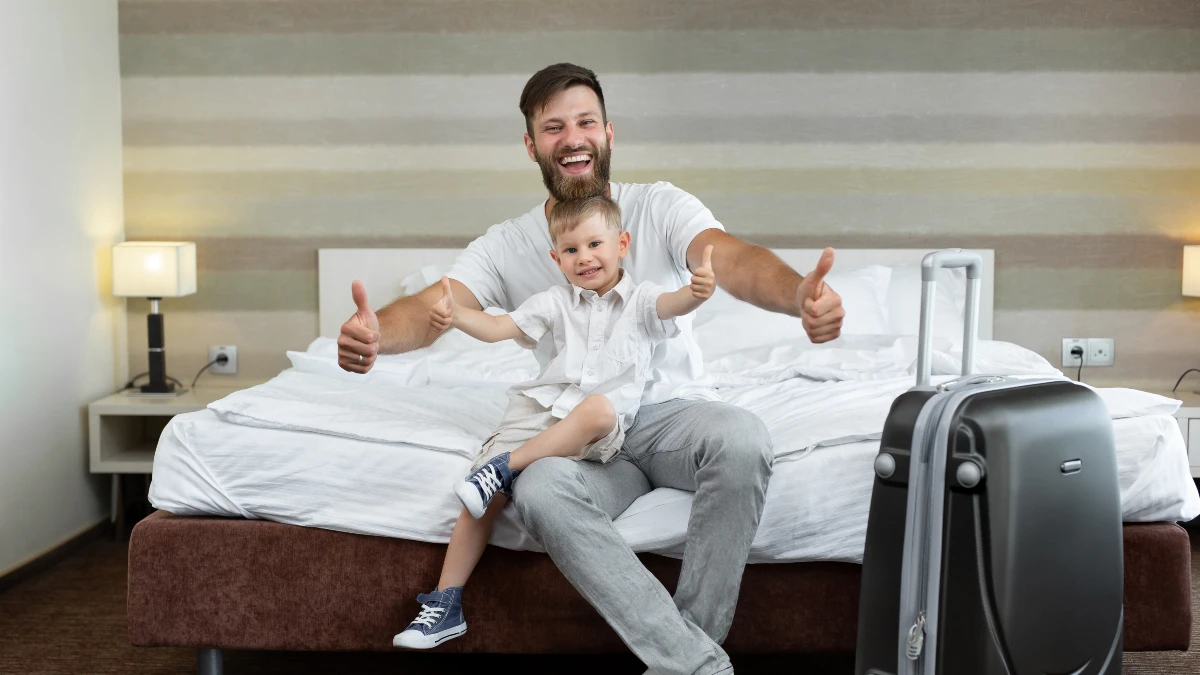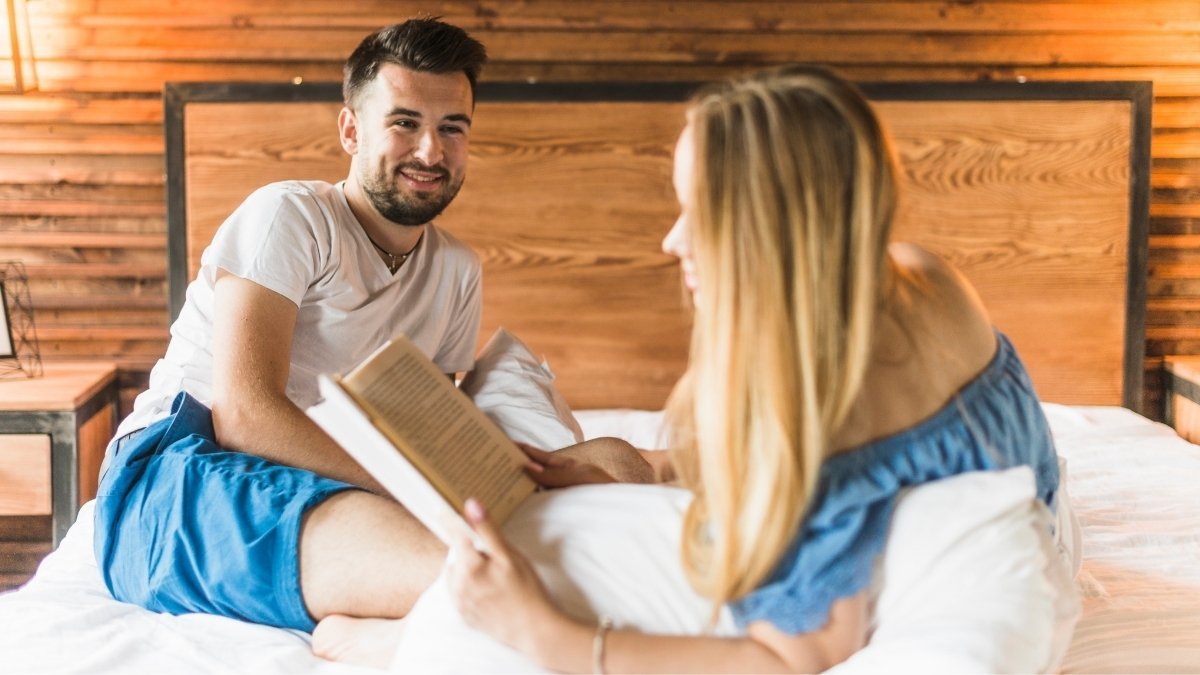You booked a single King bed for your trip. But when you get to the hotel, the front desk agent hands you keys to a room with two Queen beds. This happens all the time. It is frustrating, and it makes travelers feel cheated. You are not wrong to be confused. The room you asked for—a King bed—is usually just a request. It is not a promise the hotel has to keep.
This issue, the “hotel two beds one booked” problem, is not a simple mistake. It is the result of three complex business strategies hotels use to make more money. This guide will show you these three secrets: how hotels manage prices, how their computer systems mess up room types, and why they overbook. By knowing these rules, you can make sure you get the King bed you paid for next time.
The Real Reason Hotels Give You Two Beds When You Booked One

You made your reservation. You specifically asked for one King bed. But when you open the hotel room door, there are two double beds waiting for you. If you are traveling solo or with one partner, it can feel like the hotel made a mistake or that the room is being wasted.
While it’s easy to think the hotel simply ran out of the room you booked, the real reason this often happens is a smart business strategy. The extra bed is actually part of a deliberate plan that helps the hotel be flexible and manage its available rooms.
Why Does Your Hotel Give You an Extra Bed? The Core Strategy

This practice is key to keeping the hotel efficient and ensuring every guest gets a room, even during busy times. It comes down to two main strategies:
1. Managing Room Capacity (The Quick Swap)
Hotels need to ensure they can accommodate guests who request a King-sized bed, even if their dedicated King rooms are sold out.
- The Substitute: If a room with a single King bed isn’t available, the hotel will often move you into a room with two Queen or Double beds. This is an immediate and effective substitute.
- No Downgrade: Because a room with two beds can generally hold more people and is often classified as a slightly higher-tier room, the hotel sees this as a service, not a downgrade. It ensures you get checked in quickly when the hotel is busy.
2. The Clever Design of “Zip-and-Link” Beds
In many parts of the world, hotels use a specific type of furniture called “Hollywood twin beds” or “zip-and-link beds”. These beds are the biggest secret to hotel flexibility.
- Dual-Purpose Room: These are essentially two smaller, single beds that can be physically pushed together and then covered with King-sized linens to create one large King bed.
- Switching Guests: This allows the hotel to easily meet the needs of different travelers. They can have twin beds for business travelers during the week and quickly convert them into King beds for couples visiting on the weekend.
How This Helps the Hotel Maximize Every Inch

The ability to quickly change a room’s setup is vital for hotel operations, especially in cities where space is limited.
- Versatility Saves Space: By making a single room work as both a twin room and a king room, the hotel doesn’t have to keep an exact 50/50 split of room types. They can adjust their inventory on the fly to meet reservations as they come in, maximizing the use of all available space.
- Efficiency in Small Rooms: This conversion ability is extremely space-efficient in smaller rooms where having two separate single beds that can merge into a King makes the room far more versatile.
The next time you find yourself with an extra bed, you can appreciate the clever way the hotel is making the most of its space to meet the varying needs of its guests.
How Hotels Use Two Beds to Make More Money
Room Inventory: A Comparison
Single King Room
- Max Occupancy: 2 Guests
- Target Market: Singles, Couples
- Flexibility: Low
- Risk: High (Goes unsold if no couples/singles book)
Double Queen Room
- Max Occupancy: 4 Guests
- Target Market: Families, Friends, Colleagues, Couples
- Flexibility: High
- Risk: Low (Appeals to nearly all traveler types)

The main reason a hotel gives you two beds instead of one is about money. It’s a strategy called Yield Management. This is a smart way hotels set prices and manage rooms to earn the most money possible. The simple goal of this system is to sell the right room to the right customer at the right price. This helps the hotel increase the revenue from every room they have available.
The Superior Value of Double-Bed Inventory
For a hotel manager, having flexible rooms is very important. If a room goes unsold today, that money is lost forever. To avoid this, managers love rooms with two Queen beds.
A two-bed room can be sold to more types of travelers. It works for couples, families with kids, or two friends traveling for work. A single King room only works for couples or single people. Because the two-bed room appeals to more people, it is the best room for the hotel to keep flexible. They use it as a buffer. In big cities, two-bed rooms can actually be more expensive than King rooms because they are in high demand.
Also, it costs almost the same to clean a King room as it does to clean a two-bed room. Since the two-bed room can hold up to four guests, the hotel makes much more money from it for only a small extra cleaning cost. They have a clear reason to keep two-bed rooms open.
| Inventory Type | Typical Guest Profile | Operational Flexibility | Impact on Yield/RevPAR |
| King Bed (Single Bed) | Couples, Solo Business Travelers, Luxury segments. | Low – hard to sell if customer wants two beds. | High value per night, but often saved for important guests. |
| Double Queen (Two Beds) | Friends, Family Groups, Colleagues, Travelers who want separation. | High – can fit single, double, or four guests easily. | Often earns more revenue due to capacity and is the ideal buffer. |
The Fungibility Paradox and Inventory Prioritization
The Guest Priority Stack
👑 Top Priority
High-tier loyalty members, VIPs, and guests who booked directly at a high “rack rate.” Rooms are protected for them.
👤 Medium Priority
Standard loyalty members and returning guests. Hotels will try to honor their requests but may substitute if needed.
📝 Low Priority
Bookings from third-party sites (like Expedia, Booking.com) or those on heavily discounted rates. Most likely to be moved.
Hotels must guess how many people will show up and what they will need. This is called demand forecasting. If a hotel knows that a very important customer—like a high-status loyalty member-will arrive late and needs a King room. They will protect that King room.
The hotel might see your King room booking as a chance to be smart. By giving your King request a two-bed room instead, they keep the valuable King room free. They save the King room for the customer who might pay more or who is more important to their long-term business. Moving you to a two-bed room is not a mistake. It is a calculated move to protect and earn the most money from the single King inventory. The two-bed room acts as the hotel’s safety plan against room shortages.
Why Booking Websites Promise a King But Cannot Deliver

The money-making strategy works because of technical flaws. The hotel’s computer system often gets confused, leading to a gap between what you think you bought and what the hotel is tracking.
The Role of Hotel Technology and System Disparity
Hotels use two main computer systems. The first is the Property Management System (PMS), which runs everything inside the hotel, like cleaning and room assignment. The second is the Channel Manager, which sends room availability and prices to outside websites. Such as Expedia or Booking.com (called Online Travel Agencies, or OTAs). Rooms are grouped by size, features, and price. Keeping the room numbers consistent across all these different systems is a tough job.
The Room Type Mapping Challenge
The biggest technical problem is called Room Type Mapping. This is the complex job of making sure every room category is named the same way across all websites. The hotel might call a room a “Deluxe King,” but the OTA may just call it a “Standard Room.” If this mapping process is done wrong, the room data becomes “messy.” This lets the hotel honor the general room category you booked (“Standard Room”) while ignoring the specific King bed request.
The OTA Preference vs. Hotel Guarantee Dynamic
This is the most important fact: when you book through an OTA, your request for a specific bed type is almost always just a preference. It is not a promise the hotel must follow. You have a guaranteed reservation, meaning the hotel must hold a room for you. But they only guarantee the general room category, not the bed type inside it.
An OTA might list “Standard Room with King Bed” even if the hotel’s rule for that room is “King or Queen Bed Available.” The computer systems make perfect consistency hard to achieve. This uncertainty works in the hotel’s favor because it gives them flexibility. When things go wrong, the person who has to explain the issue is the front desk agent.
They often have to be vague, maybe saying there was an “unexpected maintenance issue,” instead of explaining complex revenue strategies. Guests like to know why things went wrong, but the hotel must protect its business secrets.
The Overbooking Secret: Why Your King Bed Gets Sacrificed

The third reason you get two beds instead of one is that hotels often intentionally overbook their rooms. This is a common defense against losing money.
The Calculated Risk of Strategic Overbooking
Many hotels sell more rooms than they actually have for a certain night. This strategy is planned. They do it because a high number of people cancel at the last minute or simply do not show up (no-shows). This no-show rate can be as high as 20% to 40%. If a hotel with 100 rooms expects 20 cancellations. They must accept 20 extra bookings just to reach full occupancy. This keeps their revenue high.
The risk of this strategy is that if too few people cancel, the hotel runs out of rooms. When this happens, they have to “walk” a guest. This means sending a confirmed guest to a different. Competing hotel and often paying them compensation. Hotels desperately want to avoid walking guests.
The Triage Hierarchy: Who Gets Sacrificed?
When the hotel is too full, they have to quickly decide who gets what room. This is called triage. The easiest and cheapest solution is to move a guest who booked a single King bed into a two-Queen room. This frees up the single King room for a guaranteed booking or a high-status loyalty guest. These high-value guests are always put first.
Giving a guest two Queen beds instead of one King is much less costly than walking them to another hotel. Walking a guest involves paying for their ride and giving them major compensation, like free meals or future credits.
The guest who accepts the two-bed room is saving the hotel from a much bigger problem. This is why travelers who use lower-priority channels, like OTAs, are often the ones who get moved: they are at the bottom of the priority list during a room shuffle.
Understanding Run of House (ROH) and Preference
Some people book a special rate called Run of House (ROH). This is usually a discount, but it means the guest gives up all say in the room type and bed size. The hotel chooses based only on what is left when they check in.
For all other bookings, your status matters. Unless you paid extra for a room that says “Deluxe King Only,” the hotel feels it can swap the bed type if they need to. The hotel’s goal is not to disappoint you, but business needs often force them to change your bed type to keep the whole hotel running smoothly.
How to Guarantee Your King Bed: A 2025 Action Plan

To stop your King bed request from being changed, you need to change it from a weak preference to a secure guarantee. The following steps provide the most current and effective way to do this.
The Paramount Importance of Direct Booking
The most important step is to never use third-party booking sites (OTAs). The bed type is never guaranteed when you book with an OTA. Hotels prefer direct bookings (on their website or phone) because they save money on commissions. When you book direct, you get loyalty perks. Priority for upgrades, and a much higher priority for the room you want compared to OTA guests.
| Booking Channel Type | Bed Type Status | Assignment Priority | What You Can Ask For If It’s Wrong |
| Direct Booking (Loyalty Member) | Usually a Guarantee (If specified) | Highest Priority; Rooms are assigned days early. | High chance of compensation or upgrade. |
| Direct Booking (Standard Guest) | Strong Preference | High Priority; Based on pre-arrival communication. | Negotiable, often a small free amenity. |
| OTA (Standard Booking) | Preference/Request Only | Low Priority; Assigned at check-in based on what is left. | Minimal; Maybe only a refund of the price difference. |
| Run of House (ROH) | No Say / Hotel’s Choice | Lowest Priority | Nothing; You accepted the room terms. |
Leveraging Loyalty Status and Psychological Ownership
If you are a member of the hotel’s loyalty program, your chance of getting the right room goes way up. High-status loyalty guests are prioritized. Hotels know that upsetting a top-tier member can cause a huge loss of business and a bad online review.
Hotels also want you to feel “psychological ownership” of your room. Studies show that when a guest can pick a detail—like the bed type—they feel more attached to the brand. This makes them loyal. As a smart traveler, you should always clearly state your bed type when you book. Use any loyalty status you have to make that choice feel like it is locked in.
The Critical Pre-Arrival Communication Strategy
Just clicking “King Bed” during the online booking is not enough. You must talk to the hotel before you arrive. The best time to call is 48 to 72 hours before your check-in day. This is when the hotel staff starts manually assigning rooms. You are catching them before the automated system messes up the assignment hours later.
You must call the front desk directly. Do not rely on an OTA chat message. When you call, use the “Politeness Protocol.” Be polite but firm about needing your specific bed type. Give them a specific request, like “a King bed on a high floor away from the ice machine.” This helps the staff manually secure a room number for you. By getting a human agent to pre-allocate a specific room number, you protect your reservation from the last-minute overbooking shuffle.
| Step | Action/Line | Why This Works |
| Identify & Confirm | “Hello, my name is [Name], arriving. I’m calling to confirm my reservation under [Confirmation Number] for a standard King room.” | Starts the relationship; makes the agent pull up your exact booking. |
| State Preference (Firmly) | “We specifically need a King bed for this trip. Can you confirm that a King room has been put aside for us?” | Changes the bed type from a “wish” to a direct requirement. |
| Offer Flexibility (Strategic) | “If the King is hard to find, we are okay with a lower floor or a room without a view, as long as the bed type is guaranteed.” | Shows you are willing to give up small things to get the King bed. |
| Express Thanks | “Thank your for securing that King for us. We look forward to our stay.” | Sets the clear expectation that the room is now secured. |
Recourse and Compensation Protocol at Check-in

If you follow all the steps and still get the wrong bed, you have a right to ask for compensation. You paid for a specific service, and the hotel did not provide it.
If they give you a Double Queen instead of a King, politely but immediately tell the hotel you cannot accept that room. Tell them you will wait for housekeeping to clean an available King room. If you are willing to wait, your request is often granted, especially if you booked direct.
If the hotel says there is truly no King room left, you need to ask for compensation for the inconvenience. Hotels want to fix problems quickly to avoid bad online reviews. Good compensation can include: a discount on the room rate, free amenities (like breakfast or a resort credit), or an immediate upgrade to a suite if it has the right bed.
If the front desk agent cannot help, ask to speak to the Manager on Duty (MOD). Managers have the power to make deals that desk agents cannot. Your power comes from the hotel’s need to keep you happy and protect their reputation.
| Scenario | What You Should Do | Best Result | Why You Have Power |
| You get the wrong bed (King booked, Double Queen received) | Politely refuse the room. Ask to wait for a King room to be cleaned. | Get the King room you booked, or an upgrade for the wait. | Hotels often give in if you insist, especially if you are willing to wait. |
| King Room is Sold Out | Ask for money back or credit right away: free breakfast, resort credit, or a discount. | Get something valuable for the hotel’s mistake. | Free things or discounts are a standard way to fix big problems. |
| Front Desk won’t help or gives vague answers | Ask to speak to the Manager on Duty (MOD). | Talk to the person who can give you free things or an honest answer. | Managers know how important your happiness is to their online reputation. |
Conclusion
The frustrating “hotel two beds one booked” problem is not usually a mean trick. It is the result of hotels trying to make the most money through price management, bad computer mapping, and strategic overbooking. These forces make inventory flexibility more important than your specific bed request.
You can take back control of your trip in 2025. Book directly with the hotel, use your loyalty status, and make a specific phone call 48 to 72 hours before you arrive. By doing these simple steps, you change your reservation from a weak request to a confirmed King Bed Guarantee. This strategy gives you certainty and makes your travel experience better.


